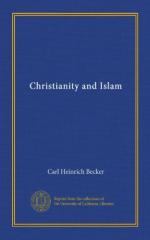Muhammed regarded Judaism and Christianity as religious movements purely national in character. God in His mercy had announced His will to different nations through His prophets. As God’s word had been interpreted for the Jews and for the Christians, so there was to be a special interpretation for the benefit of the Arabs. These interpretations were naturally identical in manner and differed only as regards place and time. Muhammed had heard of the Jewish Messiah and of the Christian Paraclete, whom, however, he failed to identify with the Holy Ghost and he applied to himself the allusions to one who should come after Moses and Jesus. Thus in the Qoran 61.6 we read, “Jesus, the Son of Mary, said: Children of Israel, I am God’s apostle to you. I confirm in your hands the Thora (the law) and I announce the coming of another apostle after me whose name is Ahmed.” Ahmed is the equivalent of Muhammed. The verse has been variously interpreted and even rejected as an interpolation: but its authenticity is attested by its perfect correspondence with what we know of Muhammed’s pretensions.
To trace in detail the development of his attitude towards Christianity is a more difficult task than to discover the growth of his views upon Judaism; probably he pursued a similar course in either case. At first he assumed the identity of the two religions with one another and with his own doctrine; afterwards he regarded them as advancing by gradations. Adam, Abraham, Moses, Jesus, and Muhammed, these in his opinion were the chief stages in the divine scheme of salvation. Each was respectively confirmed or abolished by the revelation which followed it, nor is this theory of Muhammed’s shaken by the fact that each revelation was given to a different nation. He regards all preceding prophets in the light of his own personality. They were all sent to people who refused them a hearing at the moment. Punishment follows and the prophet finds a body of believers elsewhere. These temporary punishments are confused with the final Judgment; in fact Muhammed’s system was not clearly thought out. The several prophets were but men, whose earthly careers were necessarily crowned with triumph: hence the crucifixion of Jesus is a malicious invention of the Jews, who in reality crucified some other sufferer, while Jesus entered the divine glory. Thus Muhammed has no idea of the importance of the Crucifixion to the Christian Church, as is shown by his treatment of it as a Jewish falsehood. In fact, he develops the habit of characterising as false any statement in contradiction with his ideas, and this tendency is especially obvious in his dealings with Judaism, of which he gained a more intimate knowledge. At first he would refer sceptics to Christian and Jewish doctrine for confirmation of his own teaching. The fact that with no knowledge of the Old or New Testament, he had proclaimed doctrines materially similar and the fact that these Scriptures referred to himself, were proofs of his inspired power, let doubters say what they would. A closer acquaintance with these Scriptures showed him that the divergencies which he stigmatised as falsifications denoted in reality vast doctrinal differences.




